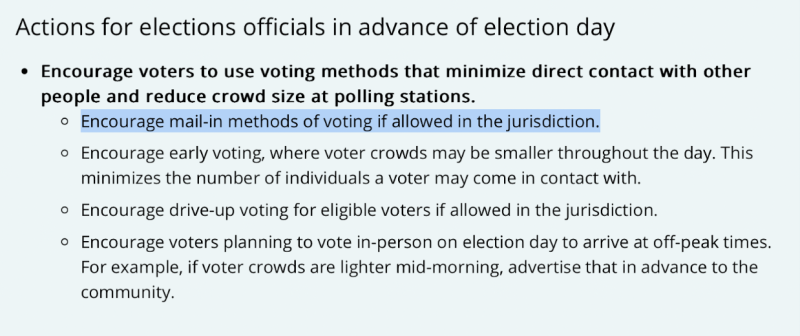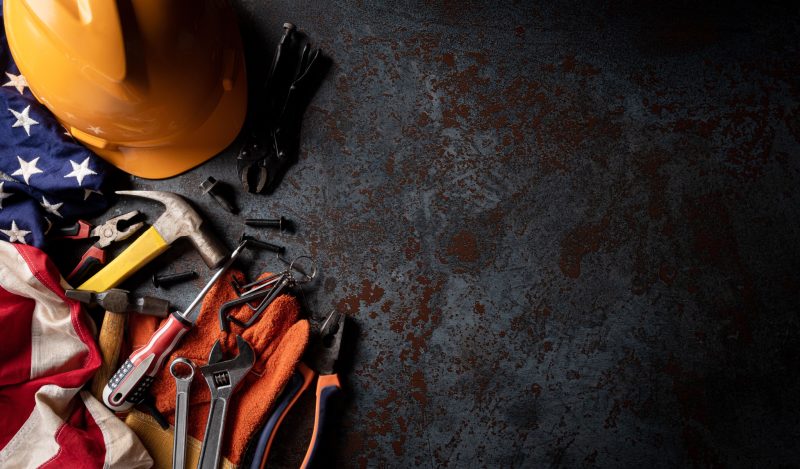In the spring of 2020, a deliberately cultivated disease fear swept across the population. Everyone was urged to do everything possible to avoid the invisible enemy.
It is an implausible request.
The terrorist-era slogan “If you see something, say something” was bad enough. This was “You can’t see something, so just do whatever.”
If you cannot see it, you cannot know where it is, in which case people filled the epistemic void with fantasies of their own invention.
It’s on this sandwich! Wait, it’s on this whole bag of groceries! It’s in this room while that room seems safer! It’s probably on the pen I just used so I’d better wash my hands! I should wear this helmet and these gloves, plus wash my dishes five times before using them! And so on.
It was all madness and it immediately affected the subject of voting, which quickly became a subject of discussion. If we are social distancing and staying home, how can we have normal elections with crowds at polling places? Surely we need a completely different system.
It was in this thicket of sudden frenzy that the CDC got involved. But not eventually involved; it was involved at the very outset.
The page is now scrubbed from the CDC website as of January this year but it has long posted voting protocols as a means of controlling infectious disease spread.
What’s fascinating is the timing. The page was updated to mention the necessity of mail-in voting on March 12, 2020. That’s the same day at Donald Trump’s famous hostage-style video that announced universal travel restrictions for Americans traveling to and from the UK and the EU, for the first time in US history.
He was so nervous that he actually garbled a sentence. He said that he would stop all goods transport. He meant to say that he would not! The correction came a day later but only after the stock market crashed.
That very day, someone went to the page on the CDC site and added that good hygiene involves pushing mail-in voting. We only know this thanks to Archive.org and checking the day-by-day timeline.

States now armed with this exhortation had every reason or excuse to liberalize their laws concerning mail-in voting. Plus with the CARES act, they were suddenly flush with billions to make it happen, all in the name of disease control. People permitted practices that otherwise would never have gone through.
In addition, the Cybersecurity and Information Security Agency, as part of the Department of Homeland Security, also took charge of securing the elections, obviously with the new liberalized ethos as part of the goal, which is to say, the opposite of security. This is the same agency that divided the workforce between essential and nonessential workers and also led the censorship charge.
There is nothing new about the controversies concerning mail-in ballots. Only half the world’s nations permit them at all. Nations such as France ban them entirely. Those that do allow this are very strict, as the US once was. You have to write in with a good excuse and then receive your mail-in ballot and there must be an exact database match. Part of this is proof of identity. This is all in the heightened interest of security.
By contrast, when I was traveling the country in October 2020, each place I landed I would receive a notification from Facebook to get my mail-in ballots. These were states where I didn’t live. I did not attempt this but I swear I could have voted six times. And otherwise you know how much controversy this elicited.
Indeed, Trump’s raison d’etre to this day is revenge for an election he says was stolen due to mail-in ballots. Well, if so, it only happened because of decisions made by his own executive agencies, CDC and CISA in particular. He has never been asked about this, by the way.
What is the precise connection between voting lines and infectious disease spread? There was every incentive to demonstrate one, something definitive to prove that in-person voting creates a super-spreader to be avoided. Despite this, there is not one single high-quality study showing some relationship. In fact, despite extensive research, I cannot find a single study that even purports to show that in-person voting spreads disease. Not one.
However, one of the few existing studies of this question from Wisconsin shows zero relationship.
In these days of fiction over science, the CDC just assumed there was some relationship and so invoked all its powers and influences over state health agencies and further to maximize mail-in voting and minimize in-person voting. It was entirely due to mail-in votes that Trump went so quickly from winning to losing literally overnight.
Here we have the nation’s great disease-mitigating agency, operating under the banner of science, issuing an order that fundamentally compromised the integrity of the very essence of American democracy without one shred of scientific evidence to justify the decision.
It does indeed stink to high heaven.
Does this imply that the goal of the whole wild episode was to unseat Trump from power? This would not explain why many of these same protocols were followed all over the world. Was Trump’s loss, real or manufactured, a benefit for those who ran the pandemic response? Most certainly. And the unearthing of this little change from the CDC – which found itself in the middle of the most contentious political struggle of modern times – certainly underscores the point.
Join the conversation:

Published under a Creative Commons Attribution 4.0 International License
For reprints, please set the canonical link back to the original Brownstone Institute Article and Author.









